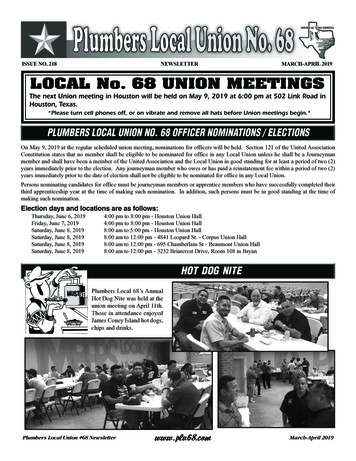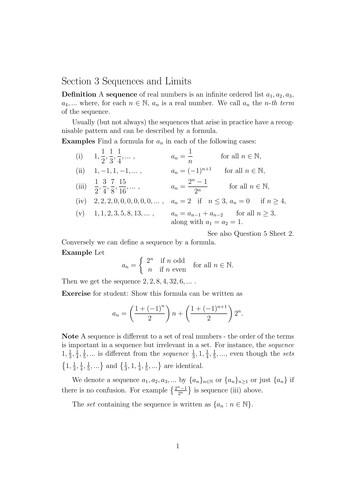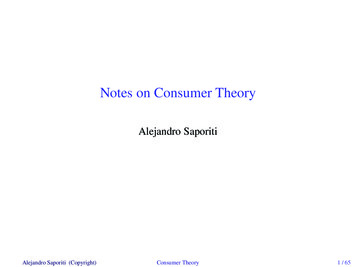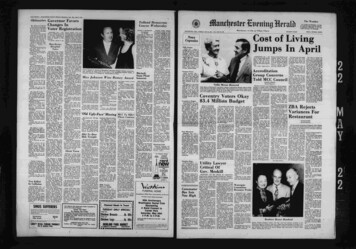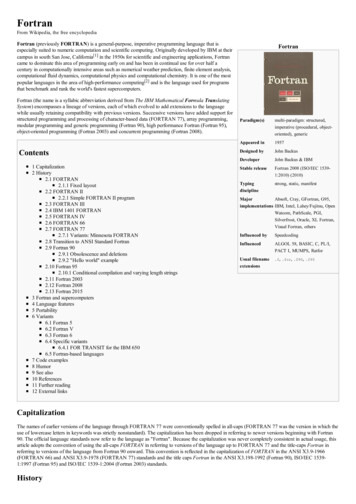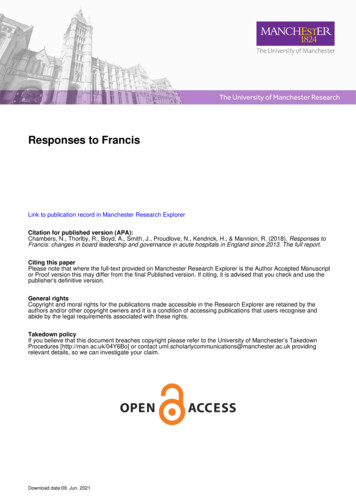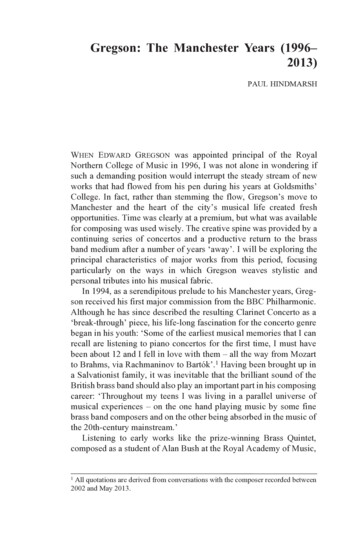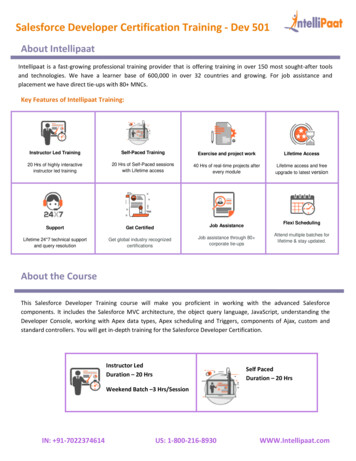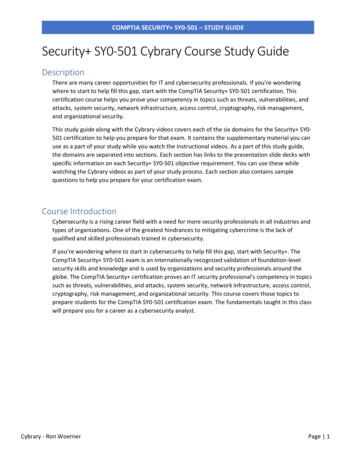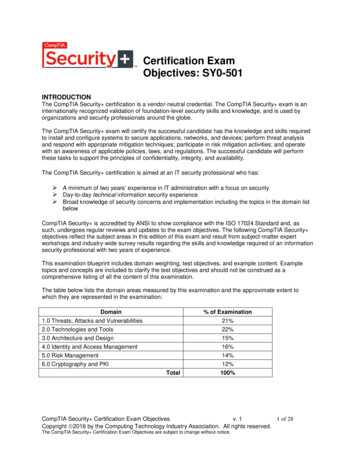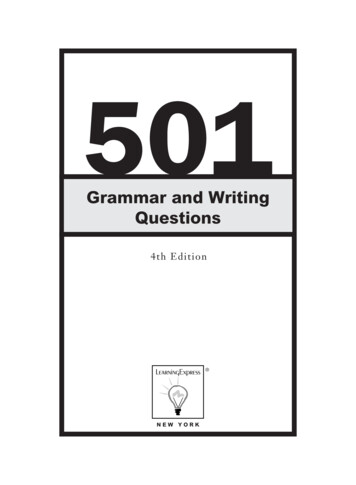
Transcription
501Grammar and WritingQuestions4th Edition NEW YORK6801 501 Grammar 4E[FIN].indd 18/19/10 2:06 PM
OTHER TITL E S O F I N T E R E S T F R O MLEA R N I N G E X P R E S S501 Reading Comprehension Questions501 Critical Reading Questions501 Sentence Completion Questions501 Word Analogy QuestionsReading Comprehension Success in 20 Minutes a DayCopyright 2010 LearningExpress, LLC.All rights reserved under International and Pan American Copyright Conventions.Published in the United States by LearningExpress, LLC, New York.Library of Congress Cataloging-in-Publication Data:501 grammar and writing questions. — 4th ed.p. cm.Spine title: 501 grammar & writing questionsIncludes bibliographical references and index.ISBN-13: 978-1-57685-748-9 (alk. paper)ISBN-10: 1-57685-748-4 (alk. paper)1. English language—Grammar—Examinations, questions, etc. 2. English language—Rhetoric—Examinations, questions, etc. 3. Report writing—Examinations, questions,etc. I. LearningExpress (Organization) II. Title: Five hundred one grammar and writingquestions. III. Title: Five hundred and one grammar and writing questions. IV. Title: 501grammar & writing questions.PE1112.A15 2010428.2'076--dc222010010694Printed in the United States of America9 8 7 6 5 4 3 2 1Fourth EditionFor more information or to place an order, contact LearningExpress at:2 Rector Street26th FloorNew York, NY 10006Or visit us at:www.learnatest.com6801 501 Grammar 4E[FIN].indd 28/19/10 2:06 PM
ContentsIntroductionvSection 1 Mechanics: Capitalizationand Punctuation1Section 2Sentence Structure17Section 3Agreement45Section 4Modifiers67Section 5Paragraph Development77Section 6Essay QuestionsAnswers147157iii6801 501 Grammar 4E[FIN].indd 38/19/10 2:06 PM
6801 501 Grammar 4E[FIN].indd 48/19/10 2:06 PM
IntroductionThis book can be used alone, along with another writing-skills textof your choice, or in combination with the LearningExpress publication,Writing Skills Success in 20 Minutes a Day. It will give you practice dealing with capitalization, punctuation, basic grammar, sentence structure,organization, paragraph development, and essay writing. It is designedto be used by individuals working on their own and for teachers ortutors helping students learn or review basic writing skills. Additionally,practicing with 501 Grammar and Writing Questions will greatly alleviatewriting anxiety.Many people grimace when faced with grammar exercises. But inorder to communicate with others, pass tests, and get your point acrossin writing, using words and punctuation effectively is a necessary skill.Maybe you’re one of the millions of people who found memorizinggrammar rules tedious as a student in elementary or high school.Maybe you were confused by all of the exceptions to those rules. Maybeyou thought they would just come naturally as you continued to writeand speak.First, know you are not alone. It is true that some people work veryhard to understand the rules, while others seem to have a natural gift forwriting. And that’s okay; we all have unique talents. Still, it’s a fact thatv6801 501 Grammar 4E[FIN].indd 58/19/10 2:06 PM
501 Grammar and Writing Questionsmost jobs today require good communication skills, including writing.The good news is that grammar and writing skills can be developedwith practice.Learn by doing. It’s an old lesson, tried and true. The 501 grammarand writing questions included in these pages are designed to provide youwith lots of practice. As you work through each set of questions, you’ll begaining a solid understanding of basic grammar and usage rules. And allwithout memorizing! This book will help you improve your language skillsthrough encouragement, not f rustration.An Overview501 Grammar and Writing Questions is divided into six sections:Section 1: Mechanics: Capitalization and PunctuationSection 2: Sentence StructureSection 3: AgreementSection 4: ModifiersSection 5: Paragraph DevelopmentSection 6: Essay QuestionsEach section is subdivided into short sets consisting of 8–20 questions.The book is specifically organized to help you build confidence as youfurther develop your written-language skills. 501 Grammar and WritingQuestions begins with the basic mechanics of capitalization and punctuation, and then moves on to grammar and sentence structure. By the timeyou reach the section on paragraph development, you will have practicedon almost 300 questions. You will then continue practicing the skills thatyou’ve already begun to master in the previous four sections, this time in combination. When you get to the last section, you’ll be ready to writeyour own essays.How to Use This BookWhether you’re working alone or helping someone brush up on grammarand usage, this book will give you the opportunity to practice, practice,practice.vi6801 501 Grammar 4E[FIN].indd 68/19/10 2:06 PM
501 Grammar and Writing QuestionsWorking on Your OwnIf you are working alone to review the basics or prepare for a test in connection with a job or school, you will probably want to use this book incombination with a basic grammar and usage text, or with Writing SkillsSuccess in 20 Minutes a Day. If you’re fairly sure of your basic languagemechanics skills, however, you can use 501 Grammar and Writing Questionsby itself.Use the answer key at the end of the book to find out if you chose theright answer, and also to learn how to tackle similar kinds of questionsnext time. Every answer is explained. Make sure you understand theexplanations—usually by going back to the questions—before moving onto the next set.Tutoring OthersThis book will work well in combination with almost any basic grammarand usage text. You will probably find it most helpful to give students abrief lesson in the particular skill they’ll be learning—capitalization, punctuation, subject-verb agreement, pronoun agreement, sentence structure,style—and then have them spend the remainder of the session answeringthe questions in the sets. You will want to impress upon them the importance of learning by doing, checking their answers, and reading the explanations carefully. Make sure they understand a particular set of questionsbefore you assign the next one.Additional ResourcesFor more detailed explanations of English grammar and usage rules, youmay want to buy—or borrow from the library—one or more of the following books:Action Grammar: Fast, No-Hassle Answers on Everyday Usage and Punctuationby Joanne Feierman (Fireside)The American Heritage Book of English Usage: A Practical and AuthoritativeGuide to Contemporary English (Houghton Mifflin)The Blue Book of Grammar and Punctuation: The Mysteries of Grammar andPunctuation Revealed by Jane Straus (Jane Straus Books)vii6801 501 Grammar 4E[FIN].indd 78/19/10 2:06 PM
501 Grammar and Writing QuestionsGrammatically Correct: The Writer’s Essential Guide to Punctuation, Spelling,Style, Usage and Grammar by Anne Stilman (Writer’s Digest Books)The Oxford Dictionary of American Usage and Style by Bryan A. Garner(Berkley Publishing Group)Woe is I: The Grammarphobes Guide to Better English in Plain English, 2ndEdition, by Patricia T. O’Conner (Riverhead Books)Writing Skills Success in 20 Minutes a Day, 3rd Edition (LearningExpress)Grammar Success in 20 Minutes a Day, 2nd Edition (LearningExpress)Grammar Essentials, 3rd Edition (LearningExpress)viii6801 501 Grammar 4E[FIN].indd 88/19/10 2:06 PM
1Mechanics:Capitalization andPunctuationEvery sentence begins with a capital, so the how-tos of capitalization seem like a logical place to begin learning about language mechanics.When doing the exercises in this section, refer to the following checklist.Matching your answer to a rule will reinforce the mechanics of writing andsecure that knowledge for you.Capitalization Checklist33 The first word of every sentence Yes, we do carry the matching bed skirt.33 The first word of a quoted sentence (not just a quoted phrase) Andwith great flourish, he sang, “O beautiful for spacious skies, for amber wavesof grain!”33 The specific name of a person (and his or her title), a place, or a thing(otherwise known as proper nouns). Proper nouns include specific locationsand geographic regions; political, social, and athletic organizations andagencies; historical events; documents and periodicals; nationalities andtheir languages; religions, their members and their deities; brand ortrade names; and holidays.16801 501 Grammar 4E[FIN].indd 18/19/10 2:06 PM
501 Grammar and Writing Questions33 The abbreviation for proper nouns. Government agencies are probably the most frequently abbreviated. Remember to capitalize eachletter. The CIA makes me feel very secure.33 Adjectives (descriptive words) derived from proper nouns.Ex: America (proper noun) the American (adjective) flag33 The pronoun I.33 The most important words in a title Last March, I endured a twenty-hourpublic reading of A Tale of Two Cities.Punctuation ChecklistPeriods33 At the end of a declarative sentence (sentence that makes astatement) Today, I took a walk to nowhere.33 At the end of a command or request Here’s a cloth. Now gently burp thebaby on your shoulder.33 At the end of an indirect question Jane asked if I knew where she had lefther keys.33 Before a decimal number Statisticians claim that the average family raises2.5 children.33 Between dollars and cents I remember when 1.50 could buy the cooleststuff.33 After an initial in a person’s name You are Sir James W. Dewault, areyou not?33 After an abbreviation On Jan. 12, I leave for Africa.Question Marks33 At the end of a question Why do you look so sad?33 Inside a quotation mark when the quotation is a question She asked,“Why do you look so sad?”Exclamation Points33 At the end of a word, phrase, or sentence filled with emotion Hurryup! I cannot be late for the meeting!33 Inside a quotation mark when the quotation is an exclamation Thewoman yelled, “Hurry up! I cannot be late for the meeting!”26801 501 Grammar 4E[FIN].indd 28/19/10 2:06 PM
501 Grammar and Writing QuestionsQuotation Marks33 When directly quoting dialogue, not when paraphrasing Hamlet says,“To be, or not to be. That is the question.”33 For titles of chapters, articles, short stories, poems, songs, orperiodicals My favorite poem is “The Road Not Taken.”Semicolons33 Between two independent clauses (an independent clause is a completethought. It has a subject and a predicate. See Section 2.) Edward joinedthe basketball team; remarkably, the 5 4 young man excelled at the sport.33 Between elements in a series that uses commas The possible dates forthe potluck dinner are Thursday, June 5; Saturday, June 7; or Monday,June 9.Colons33 Before a list Grandma brought Chloe’s favorite three sweets: chocolate kisses,Tootsie Rolls, and a Snickers bar.33 Between titles and subtitles Finding Your Dream Home: A Buyer’s Guide.33 Between volumes and page numbers Marvel Comics 21:2433 Between chapters and verse Job 4:1233 Between hours and minutes It’s 2:00 a.m.—time to sleep.Apostrophes33 Contractions: A contraction is a combination of two words into one,such as don’t (do not) and it’s (it is). The apostrophe indicates thatsome letters have been omitted: do not don[o]t; it is it[i]s Ican’t go with you.33 Possessives: A possessive is a word that shows ownership of some sort.The dog’s bowl tells us that the bowl belongs to the dog, and we make dogpossessive by adding ’s. If we have two dogs, however, we already havean s to indicate that there is more than one dog (plural). If the two dogsown the bowl, we make it possessive by adding an apostrophe after thes: the dogs’ bowl This is Mike’s house. These are the students’ desks.33 Exception: The one exception to the above rules is its and it’s. Theapostrophe in it’s indicates a contraction of it is. To make it possessive,therefore, we do not use an apostrophe: its bowl I think it’s (it is) goingto rain. The dog ate from its (possessive) bowl.36801 501 Grammar 4E[FIN].indd 38/19/10 2:06 PM
501 Grammar and Writing QuestionsCommas33 Between items in dates and addresses Michael arrived at Ellis Island,New York, on February 14, 1924.33 Between words in a list The university hired a woman to direct the Bursar’s, Financial Aid, and Registrar’s offices.33 Between equally important adjectives (be careful not to separate adjectives that describe each other) The reporter spoke with several intense,talented high school athletes.33 After words that precede a direct quotation David whined, “I am famished.”33 In a quotation that precedes a tag and is not a question or anexclamation “I am famished,” whined David.33 Around nonessential clauses, parenthetical phrases, and appositives.(A nonessential or nonrestrictive clause is a word or group of wordsthat is not necessary for the sentence’s completion; a parentheticalphrase interrupts the flow of a sentence; and an appositive is a wordor group of words that renames the preceding noun) Matt’s mother,Janie (appositive), who has trouble with directions (nonessential clause),had to ask for help.33 Before or after a dependent clause. (We will learn about dependentclauses in Section 2.) We checked our luggage (independent clause),hoping for the best (dependent clause).33 Before conjunctions. (Conjunctions are words that link two independentclauses together) Drew wanted to experience ballroom dancing before hiswedding, so he signed up for lessons at a local hall.VERBSWords that describe an action. A few examples:drive fastsleep welljump highplay ballSET 1 (Answers begin on page 157.)For the following questions, choose the lettered part of the sentence that contains a word that needs a capital letter. If no additional words should be capitalized, choose choice e. Refer to the checklist at the beginning of the chapter ifyou want to be certain about your answer.46801 501 Grammar 4E[FIN].indd 48/19/10 2:06 PM
501 Grammar and Writing Questions1. my cousin George won the blue ribbon in the contest. Noneabcde2. Professor Smith teaches french literature at the localabc community college. Nonede3. Michael Blake, jr., is such an accomplished golfer that he wonabcthree tournaments in a row. Nonede4. Catherine complained loudly, “why can’t you ever pick me upa. bcon time in the morning?” Nonede5. The Declaration of Independence is one of the most importantab documents in the history of the United States. Nonecde6. Sally’s Sweet shop, one of the oldest businesses in town, isablocated on one of the main streets of Millersville. Nonecde7. My first childhood pet, a gray cat named otis, was given to meabcas a gift on my fifth birthday. Nonede8. The local elementary school is organizing a screening of theabmovie toy story as a fundraiser. Nonecde56801 501 Grammar 4E[FIN].indd 58/19/10 2:06 PM
501 Grammar and Writing QuestionsSET 2 (Answers begin on page 157.)Choose the punctuation mark that is needed in each of the following sentences.If no additional punctuation is needed, choose choice e.9. “It isn’t fair!” shouted Martin. Coach Lewis never lets me start thegame!”a. .b. ,c. !d. “e. none10. Maureen’s three sisters, Molly, Shannon, and Patricia are all spending the summer at their grandmother’s beach house.a. ;b. —c. !d. ,e. none11. For the centerpieces, the florist recommended the following flowers daisies, tulips, daffodils, and hyacinths.a. :b. ,c. .d. ;e. none12. “What time is supper” George asked.a. ;b. ,c. ?d. :e. None66801 501 Grammar 4E[FIN].indd 68/19/10 2:06 PM
501 Grammar and Writing Questions13. Everyone was shocked when Max Smithfield—a studious, extremely bright high school senior decided that college was not for him.a. ;b. ,c. —d. :e. none14. Kims assistant, usually so reliable, has been late for work threetimes this week, without any excuse.a. ’b. ,c. ;d. .e. none15. Our class president, Horace Landek, called the meeting to orderat 4:00.a. ,b. ;c. —d. .e. none16. “I remember” Luis recollected, “the first time I was allowed towalk home from school by myself.”a. ?b. ,c. :d. ;e. none17. Madeline Larkin our office manager, is the most organized personI’ve ever known.a. :b. ;c. —d. ,e. none76801 501 Grammar 4E[FIN].indd 78/19/10 2:06 PM
501 Grammar and Writing Questions18. I spend most of my time at the gym on the treadmill walking is myfavorite form of exercise.a. ,b. ?c. ;d. !e. noneSET 3 (Answers begin on page 158.)Choose the answer that shows the best punctuation for the underlined part ofthe sentence. If the sentence is correct as is, choose choice e.19. Simone bought three new pairs of shoes even though she had putherself on a tight budget just last week.a. shoes, even though, sheb. shoes, even though shec. shoes. Even though shed. shoes; even though shee. correct as is20. Most residents of the building have air conditioners however I’vealways found that a ceiling fan is sufficient.a. air conditioners however: I’veb. air conditioners, however, I’vec. air conditioners however, I’ved. air conditioners; however, I’vee. correct as is21. “Are you OK,” asked Timothy, “Are you sure you don’t want to sitdown and rest for a while?”a. OK?” asked Timothy. “Areb. OK?” asked Timothy, “Arec. OK,” asked Timothy? “Ared. OK?” asked Timothy? “Aree. correct as is86801 501 Grammar 4E[FIN].indd 88/19/10 2:06 PM
501 Grammar and Writing Questions22. The owners of the restaurant maintain that only organic ingredients are used in their kitchen.a. maintain, that onlyb. maintain that, onlyc. maintain: that onlyd. maintain—that onlye. correct as is23. Before the student could be hired by the company, the studentsadviser had to provide a letter of recommendation.a. company the studentsb. company, the student’sc. company, the students’d. company the students’e. correct as is24. The volunteers who would like to work the morning shift shouldsign their name on this sheet.a. volunteers, who would like to work the morning shiftb. volunteers who would like to work the morning shift,c. volunteers, who would like to work the morning shift,d. volunteers who, would like to work the morning shift,e. correct as is25. The employees asked whether the company would be offeringtuition reimbursement within the next three years?a. reimbursement within the next three years!b. reimbursement, within the next three years.c. reimbursement within the next three years.d. reimbursement, within the next three years?e. correct as is26. The sky is blue, but I hear thunder in the distance.a. sky, is blue,b. sky is blue;c. sky is blued. sky is, blue;e. correct as is96801 501 Grammar 4E[FIN].indd 98/19/10 2:06 PM
501 Grammar and Writing Questions27. George as captain of the team called the plays.a. George, as captain of the team,b. George as captain of the team,c. George, as captain of the teamd. George, as captain of the team?e. correct as is28. They met for the first time on August 27, 1972 in Seattle,Washington.a. August 27 1972 in Seattle, Washington.b. August 27 1972, in Seattle Washington.c. August 27, 1972 in Seattle, Washington.d. August 27, 1972, in Seattle, Washington.e. correct as isSET 4 (Answers begin on page 158.)For each question, find the sentence that has a mistake in capitalization orpunctuation. If you find no mistakes, mark choice d.29. a. My least favorite season is Winter.b. Next Friday, Uncle Jake is coming to visit.c. Maureen served as treasurer for the women’s organization.d. No mistakes.30. a. “Can you attend next week’s meeting?” she asked.b. His new car was damaged in the accident.c. The girls’ giggled through the whole movie.d. No mistakes.31. a. Leo told her, to call the customer service department in themorning.b. She put up signs all over town, but she didn’t get any response.c. Occasionally, her neighbors ask her to feed their cat.d. No mistakes.32. a. Did you see the movie Shrek?b. She was given an award by mayor Chambers.c. Math and science are my two best subjects.d. No mistakes.106801 501 Grammar 4E[FIN].indd 108/19/10 2:06 PM
501 Grammar and Writing Questions33. a. My cat loves to sit in the window.b. The weather has been cold lately.c. Deborah moved to south Dakota.d. No mistakes.34. a. I’m wondering when the doctor will call?b. Yesterday, Bill turned 40.c. Benjamin, my younger brother, joined the Army.d. No mistakes.35. a. The school bus was late because of snow.b. Why did you say that, since it isn’t true.c. Cover your mouth when you sneeze!d. No mistakes.36. a. Rhode Island is the smallest State.b. “I know the answer to that!” Phyllis shouted.c. When you’re done, put your pencils down and look up.d. No mistakes.37. a. Please walk the dog while you’re out.b. Lets go to the movies!c. Cassandra does not like spinach.d. No mistakes.38. a. Bill seeing Betty walked the other way.b. This is the dog’s bowl.c. It’s a long way from home.d. No mistakes.39. a. Don’t stand in my way.b. Cecilia and I fought our way through the crowd.c. The vegetables were old rubbery and tasteless.d. No mistakes.40. a. Remember to walk the dog.b. “Don’t run”! Mr. Ellington shouted.c. It’s supposed to snow today and tomorrow.d. No mistakes.116801 501 Grammar 4E[FIN].indd 118/19/10 2:06 PM
501 Grammar and Writing Questions41. a. Charleen’s parents worried whenever she drove the car.b. Who designed the Brooklyn Bridge?c. Diseases like Smallpox and Polio have been eradicated.d. No mistakes.42. a. Can you find the Indian ocean on this map?b. Which river, the Nile or the Amazon, is longer?c. Lerner Avenue runs into the Thompson Parkway.d. No mistakes.43. a. He’s the best dancer in the school.b. We were planning to go, but the meeting was canceled.c. “Okay,” she said, I’ll go with you.”d. No mistakes.44. a. Does Judge Parker live on your street?b. Twenty government officials met to deal with Wednesday’scrisis.c. The Mayor spoke at a news conference this morning.d. No mistakes.45. a. My brother, Isaac, is the best player on the team.b. Because of the high cost; we decided not to go.c. Where’s your new puppy?d. No mistakes.46. a. I have learned to appreciate Mozart’s music.b. My cousin Veronica is studying to be a Veterinarian.c. Mr. Shanahan is taller than Professor Martin.d. No mistakes.47. a. “You look just like your mother,” Ms. Jones told me.b. “Please be careful,” he said.c. Tyler asked, “why do I have to go to bed so early?”d. No mistakes.126801 501 Grammar 4E[FIN].indd 128/19/10 2:06 PM
501 Grammar and Writing Questions48. a. Do you prefer root beer or orange soda?b. In which year did world war II end?c. I like to study the geography of the Everglades.d. No mistakes.49. a. Colds like many other viruses are highly contagious.b. Call me when you feel better.c. Did you wash your hands, Michael?d. No mistakes.50. a. The industrial revolution began in Europe.b. Is Labor Day a national holiday?c. General Patton was a four-star general.d. No mistakes.51. a. Carmen brought bread, and butter, and strawberry jam.b. Let’s look at the map.c. Be sure to thank Aunt Helen for the gift.d. No mistakes.52. a. My Aunt Georgia loves to read Eighteenth-Century novels.b. Eli’s sister’s cousin lives in Alaska.c. Is that a German shepherd?d. No mistakes.53. a. Those shoes are too expensive.b. Michael’s best friend is Patrick.c. Did you hear that Inez got a new puppy.d. No mistakes.136801 501 Grammar 4E[FIN].indd 138/19/10 2:06 PM
501 Grammar and Writing QuestionsSET 5 (Answers begin on page 159.)Questions 54–57 are based on the following passage. First, read the passage,and then choose the answer that shows the best capitalization and punctuationfor each underlined part.Carol walked into the (54) room switching on the light as she entered.“Where is (55) everybody?” she called. She was about to leave whenshe heard (56) giggling this made her stop and listen more carefully.She threw open the closet door and found her (57) friends they wereonly playing a prank.54. a. room; switchingb. room. Switchingc. room, switchingd. room: switchinge. correct as it is55. a. everybody,” sheb. everybody.” Shec. everybody? shed. everybody”—shee. correct as it is56. a. giggling; thisb. giggling, thisc. giggling:d. giggling? Thise. correct as it is57. a. friends, theyb. friends—theyc. friends? Theyd. friends! Theye. correct as it is146801 501 Grammar 4E[FIN].indd 148/19/10 2:06 PM
501 Grammar and Writing QuestionsQuestions 58–61 are based on the following passage. First, read the passage,and then choose the answer that shows the best capitalization and punctuationfor each underlined part.June 2, 2006Melanie Jeffords312 Maple AvenueChicago, Illinois 60632Mark (58) Franklin, general managerWholesome Food Market1245 Main StreetChicago, Illinois 60627(59) dear Mr. Franklin;I am writing to complain about the behavior of one of your salesclerks. On (60) Monday May 22nd I visited your store to return apackage of ground turkey that I had purchased the day before. WhenI explained to your sales clerk that the expiration date on the packagewas May 1st, she was (61) extremely rude and she refused to refundmy money. This is not the kind of treatment I expect from your fineestablishment. I hope you will make restitution and have a discussionwith your staff about customer service. My receipt is enclosed.Sincerely yours,Melaine Jeffords58. a. Franklin, general Managerb. franklin, General Managerc. Franklin, General Managerd. Franklin, General managere. correct as it is59. a. Dear Mr. Franklin.b. Dear, Mr. franklin,c. dear Mr. Franklin:d. Dear Mr. Franklin:e. correct as it is156801 501 Grammar 4E[FIN].indd 158/19/10 2:06 PM
501 Grammar and Writing Questions60. a. Monday, May 22nd Ib. Monday May 22nd; Ic. Monday. May 22nd Id. Monday, May 22nd, Ie. correct as it is61. a. extremely rude, and sheb. extremely rude: and shec. extremely rude? And shed. extremely rude and, shee. correct as it isNOUNSWords that name a person, place, or thing. Some examples:ca. ma. forestca. treepen166801 501 Grammar 4E[FIN].indd 168/19/10 2:06 PM
2SentenceStructureA complete sentence requires two basic elements: a subject and a predicate. A predicate is a word or phrase that acts as a verb, describing action. Asubject is generally a noun, describing who or what performed that action.A complete sentence, therefore, might contain only two words, such asthis: You go! In this example, go is the verb describing the action, and you isthe subject performing that action. Here are some more examples:The cat is black.subject predicateMike likes to eat.subject predicateThe tired students rode the bus.subject predicateNotice that the subjects and predicates in the previous examples mighteach be one word—the proper noun Mike forms one subject, and the verbgo forms one predicate—but they are often composed of phrases ratherthan single words. The phrase likes to eat works together to form one predicate, while the phrase the tired students forms a subject.176801 501 Grammar 4E[FIN].indd 178/19/10 2:06 PM
501 Grammar and Writing QuestionsThe important thing to remember is that a sentence is not completeunless it contains both a predicate (the action being performed) and a subject (the person or thing performing that action). If the subject or predicateis missing, it is an incomplete sentence or sentence fragment.Sentences, however, are generally not as short and direct as these examples; these are known as simple sentences, but most writing consists of complexsentences. Our simple sentences each consist of one clause, or one completethought. Complex sentences, however, are made up of two or more clauses,or two or more ideas combined into a single sentence.The sentence Mike likes to eat consists of one clause, one completeidea. The sentence Mike likes to eat, but he isn’t fat contains two separate ideas, each contained in a separate clause. Some clauses can standon their own as complete sentences, such as in our previous example:Mike likes to eat. He isn’t fat. These are called independent clauses; anindependent clause contains a subject (he) and a predicate (isn’t fat).Clauses that could not form complete sentences are called dependentclauses, because they depend on another clause to make sense. Here isanother example:I’ll help you on Thursday, if possible.independent clause dependent clauseThe first clause in that sentence is independent because it could stand onits own as a complete sentence: I’ll help you on Thursday. The second clause,however, is not a complete sentence—if possible; it depends upon the firstclause to make sense.Here are some more terms that you’ll need to understand:33 Independent clause: a clause that expresses a complete sentence. Monica walked on the grass.33 Dependent (subordinate) clause: a clause that does not express acomplete sentence. though it was wetMonica walked on the grass, though it was wet.33 Essential clause: a dependent clause that is necessary to the basic meaning of the completed sentence. who are pregnantWomen who are pregnant can crave salty or sweet foods.33 Nonessential clause: a dependent clause that is not necessary to the basic meaning of the completed sentence. who growls whenever thephone ringsElmo, who growls whenever the phone rings, tried to attack the vacuum cleaner.186801 501 Grammar 4E[FIN].indd 188/19/10 2:06 PM
501 Grammar and Writing Questions33 Appositive: a phrase that makes a preceding noun or pronoun clearer ormore definite by explaining or identifying it. rice pudding and fruit saladCandice’s grandfather brought her favorite desserts, rice pudding and fruitsalad.33 Fragment: a phrase punctuated like a sentence even though it does notexpress a complete thought. Timothy saw the car. And ran.33 Coordinating Conjunction: a word that joins two independent andequal clauses. (and, but, so, or, for, nor, yet) Dorothy had a beautiful rosegarden, and her yard was a profusion of color every summer.33 Subordinating Conjunction: a word that makes a clause dependent(after, although, as, because, before, if, once, since, than, that, though, unless,until
Writing Skills Success in 20 Minutes a Day. It will give you practice deal-ing with capitalization, punctuation, basic grammar, sentence structure, organization, paragraph development, and essay writing. It is designed to be used by individuals working on their own and for teachers or tutors helping studen
